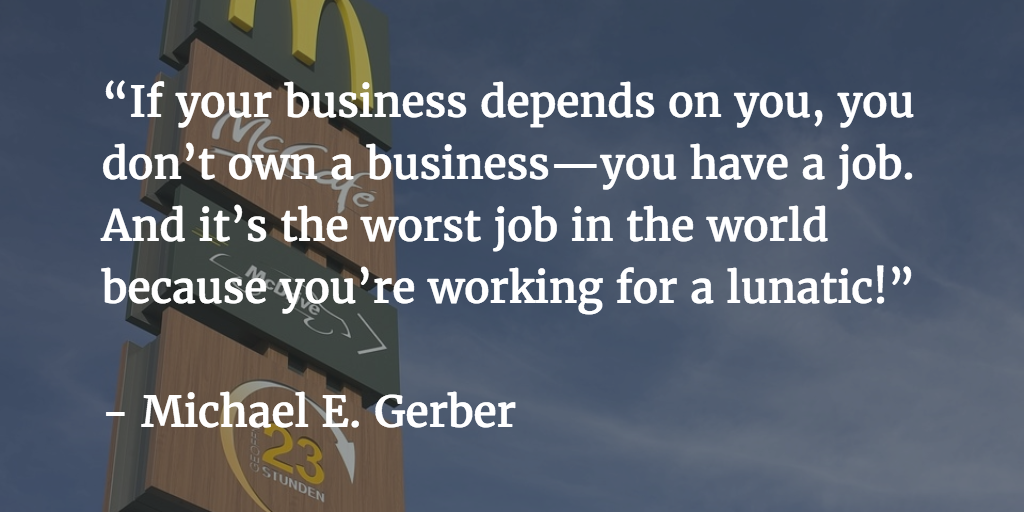1-Sentence-Summary: The E-Myth Revisited explains why 80% of small businesses fail, and how to ensure yours isn’t among those by building a company that’s based on systems and not on the work of a single individual.
Read in: 4 minutes
Favorite quote from the author:

Audio Summary
Listen to the audio of this summary with a free reading.fm account*:
Another shockingly old book. Originally published as “The E Myth” in 1986 (that’s 30 years ago, btw), Michael Gerber revised and updated the book in 1995. The E-Myth Revisited has long sold over a million copies.
You might know the common statistic that 80% of new businesses/startups fail and it’s exactly this phenomenon that Gerber digs into.
He explains how running a business and getting technical work done are two different things and shows you how you can set up a company that depends much more on systems, than on people, and can basically be handed over to anyone with the right instructions.
Here are 3 lessons that’ll help your business survive adolescence:
- Having great technical skills does not mean you know how to run a business.
- Imagine your business as a nationwide franchise from day one, then build the first store.
- The franchise approach makes sure you build a business based on systems, not people.
Ready to debunk the E-Myth? Let’s do it!
Lesson 1: Having great technical skills does not mean you know how to run a business.
4 out of 5 small businesses never make it past the 5-year mark, which is quite a depressing statistic. Why is that?
Gerber says it’s because of the entrepreneurial myth. People think being great at a technical skill also makes you great at running a business. This is just wrong.
Being a great baker, painter or writer, does not make you good at running a business in that industry. These are two entirely different things. In fact, I just recently learned that being a good writer doesn’t even make me a good freelancer.
Once you start a business, you’re not just the person doing the technical work, all of a sudden you’re also the CEO, CFO, CTO, CMO, and a whole bunch of other things.
You have to get customers, track and manage finances, create advertising material, answer customer requests, set a strategy, and, and, and…
If all you know is how to make great coffee, then your first café is very likely to fail – after all you have no clue how to hire, outsource tasks, manage people and grow a business!
Lesson 2: Think of your business as a national franchise, then start with one store.
The solution to that problem, according to Gerber, lies in systems. Ever since McDonalds, businesses have relied on franchising to make handing over the keys easy and comfortable.
If you plan your business as a nationwide franchise from day one, you’ll end up systematizing everything as soon as you get a handle on things, which will then allow you to remove and replace yourself from that particular job and sustainably grow the business.
So imagine you’re just building your first franchise store, what’s your unique value for the customers?
Maybe it’s serving the most delicious flavored lattes in town, which all come with free cookies. You as the business owner of course know how to make those, but in a franchise you must ensure that all of your employees can make them just as well.
Therefore, you should come up with incredibly detailed how-to manuals, which you can then use to train your first employee! Taking it a step further, you will eventually also have to write a manual on how to train employees, so potential franchise owners also know how to school their staff.
Your franchise prototype, combined with a set of detailed manuals for everything, will make sure that every customer has the same experience and make your business results reliable and predictable.
Lesson 3: Build a system of systems, so your business doesn’t rely on people’s skills.
If you continue to weave the idea of systems as a constant thread in your business, you’ll end up with a system of systems, which seamlessly work together.
That means you can then go and change individual parts of each system, as long as you consider the effects on the other systems. Three kinds of systems will make up your business.
- Hard systems – inanimate objects like your coffee machine.
- Soft systems – ideas and living things, like your free cookie policy or the work attitude of your employees.
- Information systems – training materials and manuals, and the data you collect, for example how many customers order lattes vs. cappuccinos.
Buying a new coffee machine will of course affect the other parts, for example your employees might not like it as much as the old one and therefore make worse lattes, so customers end up ordering more cappuccinos.
Instead of doing all the work yourself, it now becomes your job to make sure the systems run smoothly together, which will also help you make sure your future franchisees are successful in running their own cafés!
The E-Myth Revisited Review
A very interesting book. The fact that it’s old doesn’t make it any less valuable. If anything, The E-Myth Revisited is even more relevant today, as more people than ever start their own businesses – and more than ever fail.
Gerber advocates doing a lot of thinking on the front end to prevent you from maneuvering yourself into a situation you can’t get out of. Incredibly thorough and helpful read!
Who would I recommend The E-Myth Revisited summary to?
The 22 year old barista with an itch to start her own café, the 49 year old restaurant owner, who slowly has to think of retirement options, and anyone who’s started a business that’s failed.
Last Updated on July 28, 2022